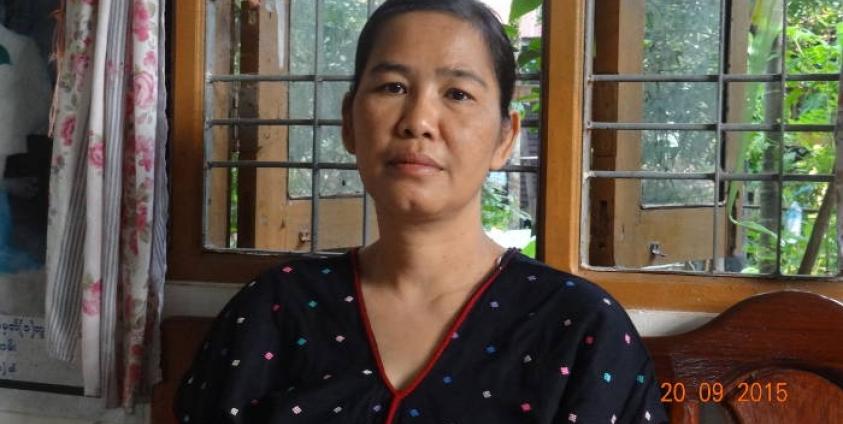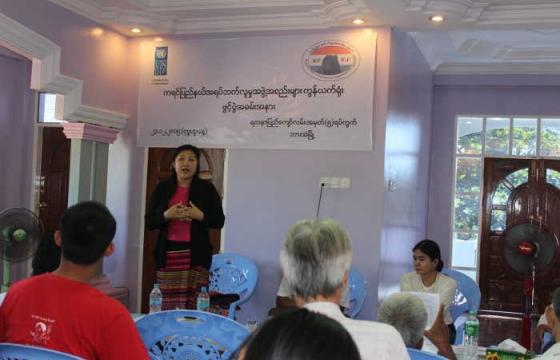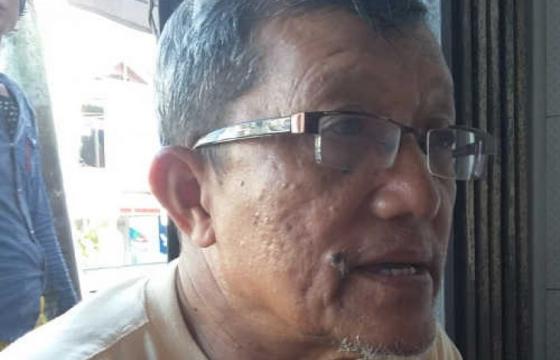Sa Ai Suu — KIC met with Nan Ni Ni Aye who is currently serving as an Upper House MP for the ruling Union Solidarity and Development Party (USDP) representing the Kamamaung constituency of Papun Township in Karen State. She was elected as an MP in 2010 before knowing fully what her role and responsibilities would be. She previously worked in the education sector. Since coming to office, she has helped build schools, upgrade roads and obtain solar panels and water for Karen State. She told KIC about her plans to fulfill the needs of the people of Karen State as she runs for a second term in the upcoming election.
Q: Please tell us about how you became involved as an MP.
A: I was selected by the USDP as a candidate for the Upper House from the Karen State Constituency No. 6 in the 2010 Election. I didn’t understand the duty of an MP and the role of parliament back then even though I was elected. To speak frankly, nobody understood it well because it was a transition period when parliament was first convened. So, we had to study the situation of international parliaments to learn how to carry out parliamentary tasks and learn about the duties of an MP. I passed my first year of Parliament unsure of things. I only really understood my duties in 2012.
Q: The USDP won back in 2010 and it was able to form a government. What are your expectations for 2015?
A: Our party is running in 1,171 constituencies in order to run in most of the constituencies nationwide. The party is working hard to win in each constituency. We will know the results on November 8th.
Q: There have been recent changes in USDP leadership. How much has this change affected the state and township levels of the party?
A: It caused a ripple effect in the outside world, but it didn’t affect us much inside our party. The party’s policies and programs didn’t change. Some people have been changed, but I’m still a central committee member of the party. There aren’t many central committee members from the Karen State. There are only about seven or eight members. Among them, I’m the only female member. There weren’t any challenges for me.
Q: The Karenni State Chief Minister has recently resigned from the USDP and is running as an independent candidate. In Karen State, candidates who are likely to become state chief ministers have changed parties. Is this because they don’t get along with the party or is it the party’s agenda? Please talk about this.
A: What I want to say is that they became ministers after they ran in the election in 2010 as party representative. When we started planning the selection of candidates this year, we asked whether they want to run again and which parliament do they want to run for . . . which parliament and constituencies are their priorities. These state chief ministers didn’t give us an answer so we replaced other candidates in their place. When the election is drawing closer, they told us that they want to run in the election. We didn’t have any vacant spot for them. It wasn’t because they didn’t get along with the party.
Q: The main problem in our country is the lack of announcements of a clear-cut policy for ethnic affairs. As a central committee member, what can you tell us about your party’s policy and future plans for ethnic affairs? As you yourself are ethnic, please tell everyone about the plans.
A: You can say our party is a union party with the involvement of all ethnic people. The Karen candidates run in Karen State while the Shan candidates run in Shan State. It’s the same for Kachin and Karreni. We don’t restrict the rights of ethnic people nor prevent them from getting their rights during the party’s internal meetings. Actually, they can fully demand their ethnic rights. Although it is the USDP, I’m a Karen so I have the Karen spirit. The Karen people tend to have some attachment to their own race. Every ethnic person has attachments of their own, but it’s important for them not to become radical. I entered this party because I believe it can give rights to ethnic people as it is a big party.
Q: I have noticed that your party’s chairman President Thein Sein has often mentioned the emergence of a federal-based Union in his monthly radio addresses. Has your party set down its plan for federal system? Please tell us about it.
A: The party has talked about the federal system, but we are still marching towards it due to our situation, the country’s situation, and the situation of the era. We still haven’t obtained federalism yet. Both my party and I have aims for a federal system. In my state, there are ethnic people who are going to sign the ceasefire agreement. Negotiations must be made in each state on what kind of federal style they want to establish.
Q: The USDP and the NLD are the major parties. I have noticed that both parties are still weak in releasing their policies on internal peace. What kind of policies does your party have on this internal peace?
A: People from our party are involved in the peacemaking groups. U Saw Tun Mya Aung from Papun in the peace group. They know about the process in details. I only learn about the discussions made on signing the NCA (nationwide ceasefire agreement) from the newspaper and TV.
Q: As you are running from the Kamamaung constituency, you’ve said that the township lacks development and security. What have you done for the security sector?
A: I can’t get involved for the security sector. The monks negotiate for us if we want to build roads. At first, they didn’t accept such kind of negotiations, but they accepted after the monks explained to them. Then, they allowed the buildings of roads. We don’t meet with their group directly.
Q: There weren’t many parties competing in the 2010 Election. Now there has been an increase so what is your view on the opposition parties?
A: The opposition party isn’t my enemy. Each of us will work for the benefits of our area. The public has to decide. I don’t say which party is bad or which candidate is bad. I don’t ask them to vote only for our party. We explain the current situation to them so that they can decide on their own. We explain about what could happen in the future.
Q: As a female candidate, to what extent are you satisfied with the increased involvement of female candidates in the 2015 Election? Can you do a little comparison?
A: Women didn’t know they should get involved in politics before. They didn’t know back in 2010. The people have become enlightened on the involvement of women now after a female MP visited many foreign countries so women became involved. But, the percentage is not very satisfactory. It’s still little. In order to increase it, first, women need to be interested in politics. Men don’t like women doing politics. They need support from the men. When the women become more involved, women and child affairs will become more successful. More opportunities can be obtained. The qualifications of women need to become more developed.
Q: What do you want to tell your voters for this year’s election?
A: I want my area to become developed. My first priority is to have peace in my area. After getting peace I want to carry out development like better transportation and electricity. My third priority is education. Our area is weak in education. We need to support the children in their education from a young age. They will become adults in their lands when they grow up. So, peace is the main priority, followed by transportation and education. After these sectors become developed, the remaining social and economic sectors will change on its own. I want to tell the public to work hand in hand with us. I want to add that I’m interested in the inclusion of female Mps. If the Karen people are interested in their own people, our country will become more developed. We need to work together to obtain a federal system. I have been on a study trip to America. There are 50 states in America. I like how the federal system works their country. Each state is governed on its own. The administration is different between each state but each state has its own laws. If we have a federal system in our country, I want to urge everyone to become interested and have good qualifications to lead their own states and people.
Biography
Nan Ni NI Aye was born on October 12th 1969 to Saw Boe Ni (a retired MP) and Nan Aye Kyi (a retired Deputy Director). She is the eldest daughter. She has a B.SC Hons: Zoology, a D.C.Sc and a M.I.Sc. She is a central committee member of the Union Solidarity and Development Party and lives on Sittaung Road, 3rd Ward, Kamamaung and No. 4/759, Inkone Road, 4th Ward, Hpa-an. She is currently serving as an MP in the Upper House. She worked as an elementary school teacher from 1993 to 2000, middle school teacher in Thingannyinaung and Hpa-an from 2001 to 2010, tutor and assistant lecturer at the University of Computers until 2010. She resigned from civil duties to run in the 2010 General Election.
Duties carried out during the parliament’s term
Chairperson – Economics and Cooperation Affairs Committee
Chairperson – Women and Children’s Affairs Committee
Secretary – Parliament Rights Committee
Member – Bill Committee
Member – Public Complaint and Appeal Committee
Member – Parliament Administrative Policy Affairs Negotiation Committee
Member – Myanmar-Laos Parliament Friendship Group
Member – Myanmar-Australia Parliament Friendship Group
Foreign experience relating to parliament
During the her first term in office Nan Ni Ni Aye traveled in her capacity as a Burmese MP to observe politics and nation building in China, Singapore, Indonesia, Sweden, Azerbaijan, New Zealand, the Philippines, the UK and the US.
Translated by Thida Linn with editing by BNI staff.






